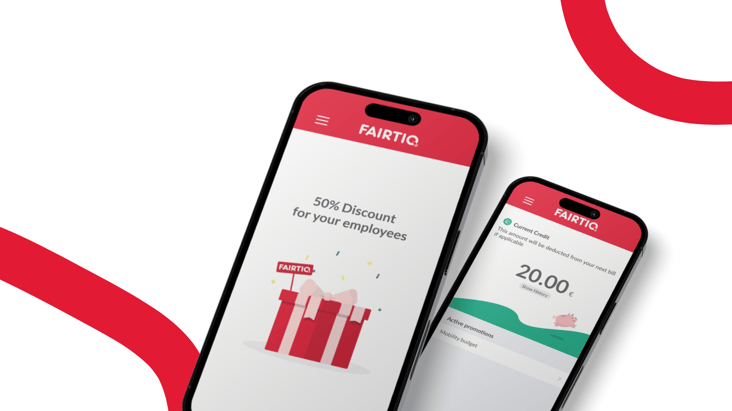
How a leading Swiss construction company is transforming the mobility of its employees sustainably
Experts in transport planning and research agree: mobility budgets for employees enhance flexibility, contribute to the modal shift in transport paradigms, help companies reduce costs, and position themselves as sustainable employers in the competition for talent.
But how do mobility budgets work in practice? Why should a company offer its employees the option of using alternative modes of transport? What should be considered when introducing them? We posed these and other practical questions to a woman who knows the answers.
Annelore Kleijer is a CSR engineer (CSR = Corporate Social Responsibility) at Groupe Grisoni, a leading Swiss construction company with around 1,300 employees. The company’s headquarters are in Vuadens in the canton of Fribourg. Groupe Grisoni recently introduced the FAIRTIQ mobility budget for some of its employees. In the interview, Annelore Kleijer provides an initial insight into the experiences so far.
Details and further insights, as well as the opportunity to speak directly with Annelore Kleijer, will be available in our FAIRTIQ webinar in September. More information can be found at the end of the interview.
FAIRTIQ: What prompted Groupe Grisoni to focus on employee mobility and offer alternative solutions?
Annelore Kleijer: The Grisoni Group operates several branches in Romandy, the French-speaking part of Switzerland. In some branches, the number of employees has significantly increased, while the number of parking spaces has remained the same, leading to a parking shortage.
We want to motivate commuters, in particular, to use alternative modes of transport, especially public transport, as well as to explore active travel options like cycling or walking. At the same time, we aimed to ensure that work-related journeys, such as visits to clients or partner companies, are no longer exclusively made by car.
We also wanted to incentivise more sustainable choices for private journeys. Another important aspect is that we must, and want to, contribute to fulfilling the mobility law of the canton of Fribourg. The law aims to permanently reduce car traffic and the FAIRTIQ mobility budget is part of our mobility plan to address all these challenges.
|
How the FAIRTIQ Mobility Budget Works With the FAIRTIQ mobility budget, companies decide on the number and amount of the budget, which can be used for business or even private journeys. Usage is enabled through an activation code in the FAIRTIQ app. With this, employees have access to the simplest public transport ticket in Switzerland and Liechtenstein, as well as with our partners in Austria, Germany, France, and the Czech Republic. Tailored solutions for companies are also possible, such as discounted or free journeys between company locations. In cooperation with transport companies, transport associations, or other mobility providers, mobility budgets can also be integrated into existing fare offers to create additional incentives for the use of public transport. |
FAIRTIQ: What goals are you aiming to achieve by introducing the FAIRTIQ mobility budget?
Annelore Kleijer: We have three specific goals. First, we want to reduce unauthorised parking around our company sites. Second, we want to offer our employees the opportunity and incentive to try alternatives to cars. Third, we want to encourage them to use public transport more frequently in their private lives.
FAIRTIQ: What does the mobility budget you implemented with FAIRTIQ look like?
Annelore Kleijer: We specifically focused on those who have a company car. We want company car users to consider using other forms of transport for their commute, for business appointments, and for business trips when their schedule allows it. Currently, the company car can also be used for private journeys at no cost, whereas using public transport has previously been at the employee’s expense.
To encourage the switch for private travel, the mobility budget can now also be used for family trips outside of working hours. The mobility budget is topped up at the beginning of each month with an amount determined by the company.
The mobility budget is part of a comprehensive mobility plan with various measures designed to reduce the use of cars and lower our transport-related environmental impact. The plan is incentive-based and non-mandatory, as we don’t want to force people to change, but rather sustainably increase motivation for environmentally conscious behaviour.
FAIRTIQ: What made you choose FAIRTIQ as a partner for implementing the mobility budget?
Annelore Kleijer: We were looking for the simplest possible solution to make public transport more appealing to company car users. We wanted to avoid unnecessary bureaucracy, such as extensive expense claims, which could significantly reduce employee motivation. Additionally, we wanted to ensure that the HR department was not burdened with additional control and billing efforts. On the administrative level, with FAIRTIQ we receive a simple monthly invoice and can track usage through a dashboard, which allows us to analyse its use.
|
Incentive Instead of Effort: The FAIRTIQ Mobility Budget Keeps Processes Lean With the FAIRTIQ mobility budget, employees and companies remain flexible – and processes are kept lean. The employee mobility budget is not a rigid subscription. Only the budgets actually used by employees are charged. Companies always retain full control over costs. No advance payment is required, and there is no recurring billing effort. Employees can use the budgets flexibly – for all (agreed) journeys at any time. With the FAIRTIQ app, they not only benefit from convenient check-in/check-out but also keep track of their current budget. Once the budget is exhausted, they can continue to use the app at their own expense until the next month’s budget is released. |
FAIRTIQ: What further plans do you have to improve employee mobility at Groupe Grisoni?
Annelore Kleijer: Our headquarters in Vuadens is located in an industrial area, where companies from various sectors are based. We are already working closely with some of these companies to find holistic and sustainable solutions for mobility and transport in the area, including with the Freiburg Transport Company (TPF). In addition, we are cooperating with the municipality of Bulle, which is responsible for development plans. With the arrival of Rolex in the industrial zone, the mobility issues will further intensify.
FAIRTIQ: Thank you for the interview, Annelore Kleijer.
Get inspired! Our exclusive webinars in September offer even more information and practical insights into mobility budgets as part of modern mobility strategies for companies.
Join Annelore Kleijer, CSR engineer at Groupe Grisoni, and Bruno Rohner, Lead B2B at FAIRTIQ, in our French-language webinar on Thursday, 26th September at 11:00 am (CET) on the topic "Mobility Budgets: A Real Lever for the Environment and the Economy".
Learn more about "Mobility Budgets with a Swipe: How Sustainability and Flexible Work Models Finally Come Together" using the example of Hilti AG in our German-language webinar on Wednesday, 25th September 2024 at 11:00 am (CET) with Daniel Oehry, HR Project Manager at Hilti AG, as well as Bruno Rohner and Felix Urban from FAIRTIQ.









Share